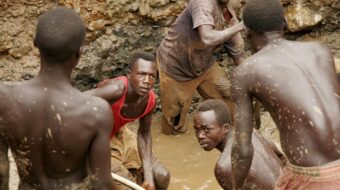Honduras’s congress passed a law privatizing public education in late March. Unleashing cruel repression, the government declared a month long teachers’ strike illegal, threatening dismissals and salary cuts. On April 5, teachers returned to their schools for two weeks, taking the government up on its offer to negotiate.
Two sets of realities are opposed: a small, wealthy, U.S.-backed minority holding sway in the western hemisphere’s third poorest country, and popular mobilization, always in the background, but now gathering new strength.
In 1979, military governments gave way to political parties beholden to the country’s elite. The murderous Battalion 3-16 took this opportunity to latch onto CIA support and the U.S. Joint Task Force Bravo, based at the Soto Cano Air Base, to back Contra mercenaries against Nicaragua’s revolution and beef up Central American militaries. Over 10 years, Washington provided Honduras with weapons worth $18.4 million and military training valued at $15 million.
To keep its brand of politics on top, the business class formed the Honduran National Business Council, now 50 years old, and the Alliance for Honduras’s Progress. The latter, promoted by former U.S. ambassador John Negroponte, was all about “anti-terrorist and anti-communist” stratagems. Members of both groups spurred on the recent coup, which removed President Jose Manuel Zelaya on June 28, 2009.
In the Lower Aguan valley, Miguel Facusse and other moguls have swallowed up wide swatches of land. With international funding, they’ve created a palm oil empire to market biofuel. Facusse’s private army, joined by public forces, is engaged in chasing peasants from lands they gained through land reform.
Popular struggles in Honduras have ebbed and flowed, ranging from liberals calling for regional unity and labor rights to guerrilla insurgencies. Striking banana workers paralyzed the country for two months in 1954. Elected governments have been in charge for three decades. President Zelaya, elected under the Liberal Party banner, proposed a minimum wage and constitutional assembly, re-introduced land reform in Lower Aguan, and brought Honduras into the ALBA Latin American integration alliance. This was all too much for moneyed interests, so he was overthrown
The struggle is heating up. The United Aguan Peasant Movement (MUCA) has defied land grabs for ten years. Members stay on plots essential to their own survival, despite murderous assaults. Since January 2010, 21 MUCA activists have been assassinated. MUCA leader and torture victim Juan Chinchilla told an interviewer, “I’m determined to re-found my country.” For Miguel Ramirez of MUCA, “The resistance has to move this country forward. It’s our only hope.”
The National Front for Popular Resistance (FNRP), formed the day President Zelaya was expelled, has been organizing demonstrations, marches, and protests. Its militants have been killed, tortured, wounded, and imprisoned. Last year, the FNRP secured 1.3 million signatures on a petition for a constituent assembly. On February 26-27 in Tegucigalpa, the FNRP held its first National Assembly. On hand were 1,500 delegates from all 18 of the nation’s departments. They formed a 150-member intermediate assembly that would choose a 26-member national executive committee. President José Manual Zelaya and labor leader Juan Barahona were named as general coordinator and sub-coordinator, respectively. The decision was made that FNRP electoral participation was put off until President Zelaya returned, a new electoral law was in force, and a FNRP constituent assembly was convened.
The FNRP affiliated Union of Beverage and Related Industry Workers articulated some of the movement’s ideological grounding. They called for unity in opposition to “parallel fronts” fixed on elections, also for inclusiveness, epitomized in a quote from Karl Marx: “All social struggle is political and all political struggle is social.” The statement added, “Existing contradictions require deep discussion and ideological solutions, because we are in a process of sharpened class struggle.” The object is to “convert the FNRP into a true option of political power.”
Significant international solidarity has materialized. “You can’t have a coup in Latin America without the consent of the U.S. government,” said Noble Peace Prize winner Adolfo Pérez Esquivel, member of a visiting international Truth Commission. “That new assault on democracy,” he said, referring to the coup, “affects the entire Latin American continent. People themselves have to make choices.”
The beverage workers’ union is paying the price. Assailants attacked its Tegucigalpa office with explosives, tear gas and rocks on March 30. Regional vice president Eduardo Argueta was severely wounded on March 1. General Secretary Carlos Reyes and local leaders Douglas Ramón Gómez and Nelson Eliberto Lopez have been seriously injured.












Comments